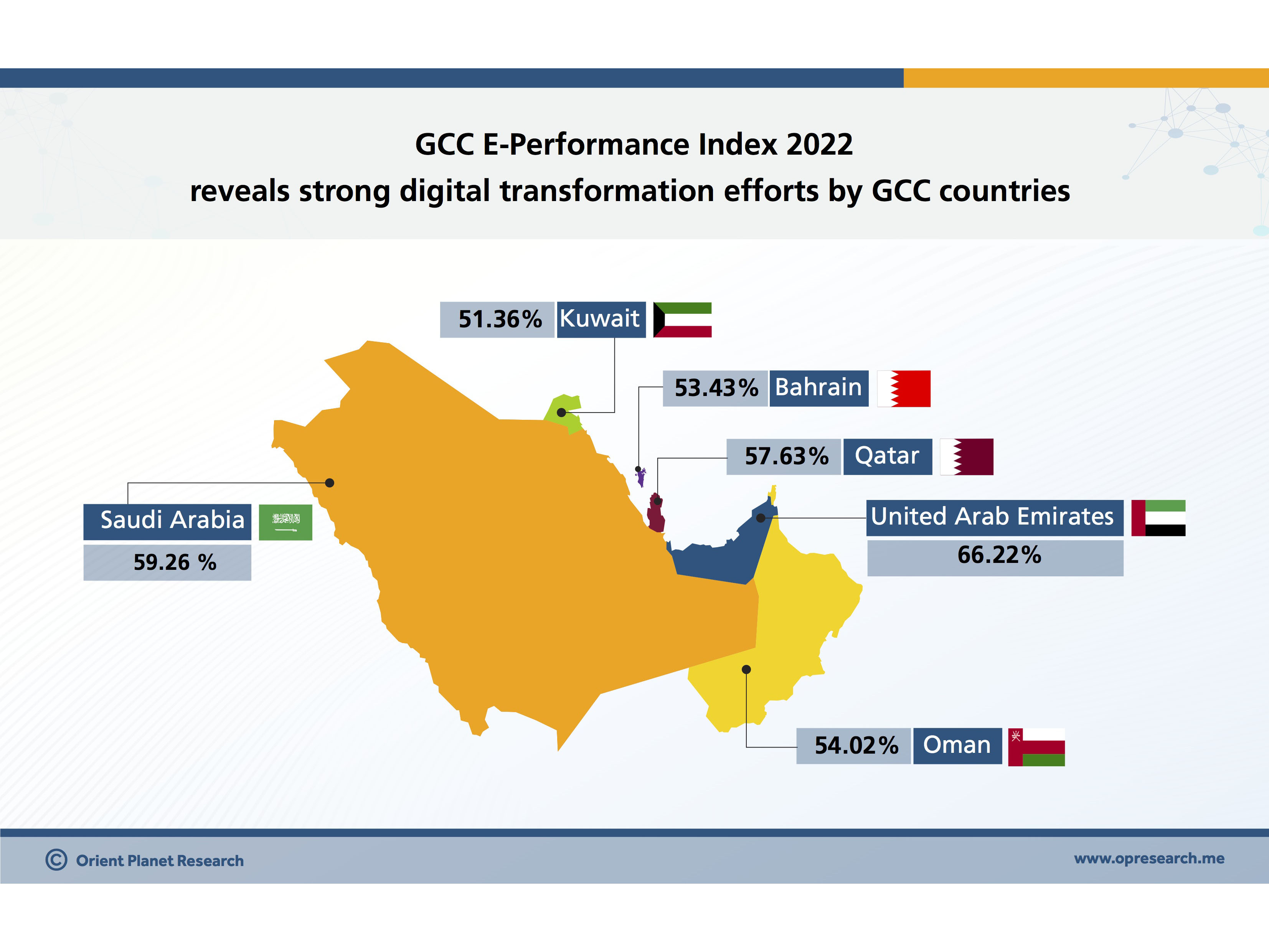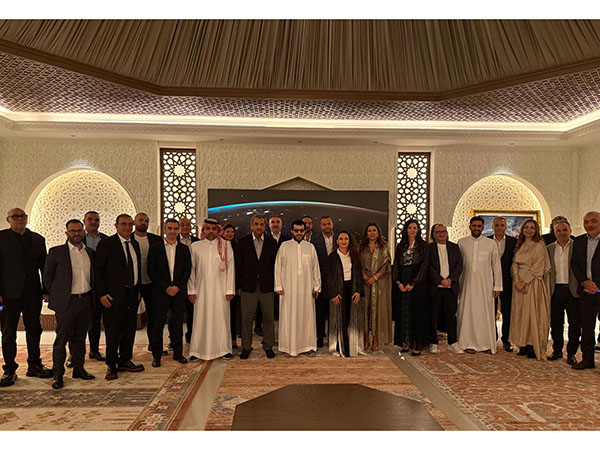News - News In Brief
GCC E-Performance Index 2022 reveals strong digital transformation efforts by GCC countries
December 27, 2022

The latest GCC E-Performance Index 2022 reveals that all countries from the Gulf Cooperation Council (GCC) region have performed exceptionally well on five major global indicators, displaying significant progress in digital transformation.
The report was issued by Orient Planet Research (OPR), an independent unit of Orient Planet Group (OPG), in collaboration with information and communications technology (ICT) expert and independent researcher Abdul Kader Al Kamli.
The UAE achieved tangible growth in the GCC E-Performance Index with an average score of 66.22, followed by Saudi Arabia with an average rating of 59.26 and Qatar with 57.63. Oman, Bahrain and Kuwait scored average ratings of 54.02, 53.43 and 51.36 respectively. The report highlights the increased spending on latest technological solutions to achieve digitally inclusive economies. According to a recent report, UAE’s ICT spending is estimated to reach USD 23 billon by 2024, while Qatar’s spending will be around USD 9 billion, and Kuwait’s spending is predicted to reach USD 10.1 billion by 2024.
The GCC countries have increasingly focused on the roles of science and technology in building research development and innovation (RDI) capacity to create national innovation systems (NIS). The World Economic Forum highlighted the unique set of characteristics of the GCC countries that presents numerous opportunities in leveraging emerging technological solutions to create opportunities. The introduction of 5G and associated use cases, such as education, health, government and smart cities, can help mitigate some regional and local challenges, including natural resource management and economic diversification, with a view towards sustainable development and inclusive growth.
Nidal Abou Zaki, Managing Director, Orient Planet Group, said: “The GCC countries have taken major strides for an overall digital transformation. The GCC E-Performance Index 2022 highlights the preparedness of the GCC nations to strengthen their global position in the evolving digital world. The countries have expanded their digital sectors in the last decade, investing in digital infrastructure, adopting e-government platforms, and launching technology parks and business incubators. GCC countries have constantly implemented innovative strategies to boost digital transformation reflecting the region’s competitiveness to secure global positions in technology. The GCC countries are engaging in large-scale transformations and economic diversification strategies to maximize efficiency throughout their economies and digitisation will be the key enabler in achieving such goals.”
The GCC E-Performance Index aggregates each countries’ performance in the top five global indices – The Global Talent Competitiveness Index (GTCI) 2021 by INSEAD, The Network Readiness Index (NRI) 2021 by Portulans Institute, Government AI Readiness Index 2021 (GAR) by Oxford Insights, The Global Innovation Index (GII) 2022 by World International Property Organization (WIPO) and UN E-Government Development Index (EGDI) 2022 by the United Nations.
There have been major developments in the UAE with the recent Al Amal (Hope) Mars mission, which helped raise the profile of technology skills in the GCC. Though the region is still reliant on oil and gas production and exports, countries are making efforts to diversify their economies. S&P Global projected that non-oil GDP in Gulf countries will reach nearly 37 per cent by 2022 as compared to 29.2 percent in 2012.
The GCC region’s ICT development has strengthened the digital economy, enhanced productivity, and created efficient means for direct access to government e-services. A report by Global Data projected Bahrain’s spending to grow at a compound annual growth rate (CAGR) of 8.6 per cent from USD 1.4 billion in 2019 to USD 2.1 billion by 2024. Another report by International Data Corporation (IDC), projects Saudi Arabia to spend USD 30.9 billion, with public sector spending reaching USD 3 billion by the end of 2022.
Abou Zaki further highlighted that the GCC E-Performance index reflects the GCC member countries’ efforts to achieve overall digital transformation, along with current developments and future avenues that may arise. He stated that trends such as bolstered digital transformation investments, citizen-centric e-government services, multi-cloud strategies, ventures in the metaverse, are setting the scene for a dynamic digital future. Relevant entities, decision-makers and policymakers can leverage the findings of the index to devise strategies to enhance their digital transition efforts. He emphasised that the GCC nations are gaining momentum in terms of development in technological infrastructures and paving way for economic diversification.
Abdul Kader Al Kamli, ICT expert and independent researcher, said: “The GCC E-Performance Index reveals the strong position of GCC countries in five top global indexes, with the UAE leading the region. The GCC countries has been at the forefront of digital transformation efforts, and its efficient strategies will reinforce the nation’s global position in the sector. There have been tremendous developments in digital innovations in the region, and we can expect an upward trajectory in terms of digital innovation.”
Recognising the plethora of opportunities and challenges posed by Fourth Industrial Revolution, governments across the GCC have prioritised digital transformation keeping it at the core of their economic and social development plans. As a key component of their respective Vision 2030 plans, the UAE, Saudi Arabia, and Kuwait have each launched various significant digital initiatives. The Expo 2020 Dubai became the first World Expo and the Arab world’s biggest event to utilise a multi-cloud approach for its infrastructure, leveraging Etisalat 1C and AWS.
The GTCI 2021 assesses the capability of countries to grow, attract and retain talent and includes 175 cities from 79 economies around the world. According to the GTCI report, the UAE’s key asset is its capability to attract talent that has been boosted by its excellent external openness. The nation also ranks in the top 10 position for the sub-pillar related to access to growth opportunities and has good possibilities for lifelong learning.
The NRI 2021 ranks 130 countries in terms of network readiness in four key pillars – technology, people, governance, and impact. According to the NRI report, the UAE performed strong across all pillars, with particular strength in the people pillar. Saudi Arabia improved by one position in the NRI 2021 due to increased performance results in the technology pillar.
The GAR 2021 considers the integration of AI in improving delivery of public services and ranks countries on a total of 42 indicators across the government sector, technology sector, and data and infrastructure. According to the GAR report, the GCC region is one of the most diverse in the world in its Government AI Readiness scores. The report further highlighted Oman for its capabilities to adopt AI, with the nation’s upcoming AI strategy that will boost its strengths.
The GII 2022 measures the performance of 132 countries in the innovation sector and monitors latest trends in global innovation. It considers seven categories, which are, institutions, human capital and research, infrastructure, market sophistication, business sophistication, knowledge and technology outputs, and creative outputs, which accounts for a total of 84 indicators.
Lastly, the EGDI ranks 193 UN member nations for their development and progress in achieving a digital government system. According to the EDGI report reveals that currently the UAE Government offers 500 online services for public institutions and users. The report further highlights Saudi Arabia's exceptional performance in various fields of e-government development, reporting a significant improvement economically and socially.
The research team for GCC E-Performance Index calculated the average of each GCC country per indicator on the basis of a unified scale of 0 to 100, keeping in mind that all indicators do not utilize the same scale. The scores were adjusted according to the calculated average, staring from highest value
The GCC E-Performance Index evaluates GCC member countries on several different parameters indicative of growth, which are based on their performance in major global indices. The index highlights the increasing investment by the GCC countries for integration of latest technological solutions across various sectors including healthcare, technology, food services, aviation and education.













